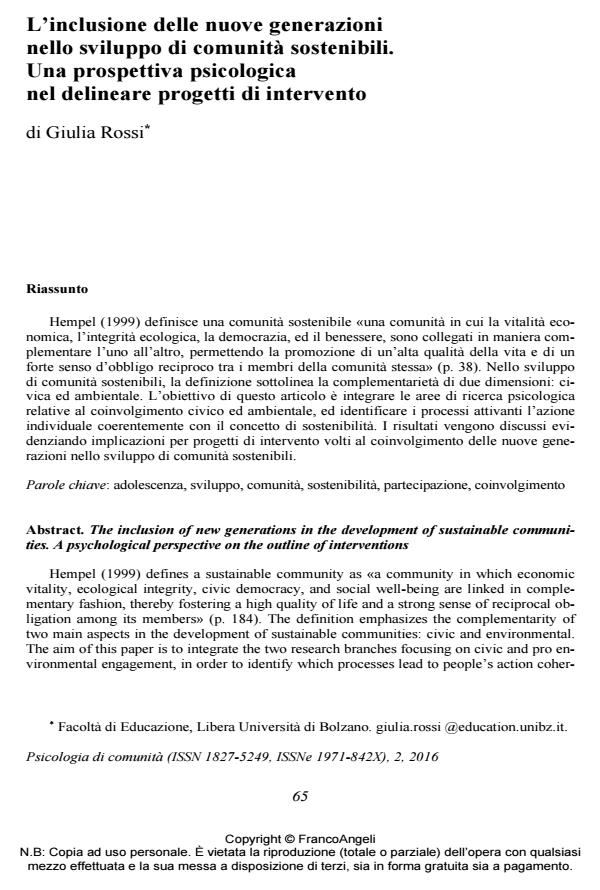L’inclusione delle nuove generazioni nello sviluppo di comunità sostenibili. Una prospettiva psicologica nel delineare progetti di intervento
Titolo Rivista PSICOLOGIA DI COMUNITA’
Autori/Curatori Giulia Rossi
Anno di pubblicazione 2017 Fascicolo 2016/2
Lingua Italiano Numero pagine 14 P. 65-78 Dimensione file 559 KB
DOI 10.3280/PSC2016-002007
Il DOI è il codice a barre della proprietà intellettuale: per saperne di più
clicca qui
Qui sotto puoi vedere in anteprima la prima pagina di questo articolo.
Se questo articolo ti interessa, lo puoi acquistare (e scaricare in formato pdf) seguendo le facili indicazioni per acquistare il download credit. Acquista Download Credits per scaricare questo Articolo in formato PDF

FrancoAngeli è membro della Publishers International Linking Association, Inc (PILA)associazione indipendente e non profit per facilitare (attraverso i servizi tecnologici implementati da CrossRef.org) l’accesso degli studiosi ai contenuti digitali nelle pubblicazioni professionali e scientifiche
Hempel (1999) definisce una comunità sostenibile «una comunità in cui la vitalità economica, l’integrità ecologica, la democrazia, ed il benessere, sono collegati in maniera complementare l’uno all’altro, permettendo la promozione di un’alta qualità della vita e di un forte senso d’obbligo reciproco tra i membri della comunità stessa» (p. 38). Nello sviluppo di comunità sostenibili, la definizione sottolinea la complementarietà di due dimensioni: civica ed ambientale. L’obiettivo di questo articolo è integrare le aree di ricerca psicologica relative al coinvolgimento civico ed ambientale, ed identificare i processi attivanti l’azione individuale coerentemente con il concetto di sostenibilità. I risultati vengono discussi evidenziando implicazioni per progetti di intervento volti al coinvolgimento delle nuove generazioni nello sviluppo di comunità sostenibili.
Parole chiave:Adolescenza, sviluppo, comunità, sostenibilità, partecipazione, coinvolgimento
Jel codes:I31, I38, Z13
Giulia Rossi, L’inclusione delle nuove generazioni nello sviluppo di comunità sostenibili. Una prospettiva psicologica nel delineare progetti di intervento in "PSICOLOGIA DI COMUNITA’" 2/2016, pp 65-78, DOI: 10.3280/PSC2016-002007